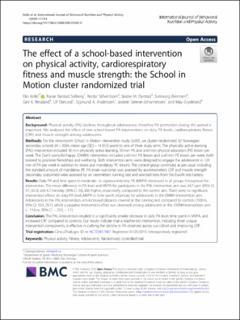| dc.contributor.author | Kolle, Elin | |
| dc.contributor.author | Solberg, Runar Barstad | |
| dc.contributor.author | Säfvenbom, Reidar | |
| dc.contributor.author | Dyrstad, Sindre Mikal | |
| dc.contributor.author | Berntsen, Sveinung | |
| dc.contributor.author | Resaland, Geir Kåre | |
| dc.contributor.author | Ekelund, Ulf | |
| dc.contributor.author | Anderssen, Sigmund Alfred | |
| dc.contributor.author | Steene-Johannessen, Jostein | |
| dc.contributor.author | Grydeland, May | |
| dc.date.accessioned | 2020-12-28T11:04:08Z | |
| dc.date.available | 2020-12-28T11:04:08Z | |
| dc.date.created | 2020-12-14T16:30:57Z | |
| dc.date.issued | 2020 | |
| dc.identifier.citation | Kolle, E., Solberg, R. B., Säfvenbom, R., Dyrstad, S. M., Berntsen, S., Resaland, G. K., Ekelund, U., Anderssen, S. A., Steene-Johannessen, J., & Grydeland, M. (2020). The effect of a school-based intervention on physical activity, cardiorespiratory fitness and muscle strength: the School in Motion cluster randomized trial. International Journal of Behavioral Nutrition and Physical Activity, 17(1). | en_US |
| dc.identifier.issn | 1479-5868 | |
| dc.identifier.uri | https://hdl.handle.net/11250/2721001 | |
| dc.description.abstract | Background
Physical activity (PA) declines throughout adolescence, therefore PA promotion during this period is important. We analyzed the effect of two school-based PA interventions on daily PA levels, cardiorespiratory fitness (CRF) and muscle strength among adolescents.
Methods
For the nine-month School in Motion intervention study (ScIM), we cluster-randomized 30 Norwegian secondary schools (N = 2084, mean age [SD] = 14 [0.3] years) to one of three study arms. The physically active learning (PAL) intervention included 30 min physically active learning, 30 min PA and a 60 min physical education (PE) lesson per week. The Don’t worry-Be happy (DWBH) intervention included a 60 min PA lesson and a 60 min PE lesson per week, both tailored to promote friendships and wellbeing. Both intervention arms were designed to engage the adolescents in 120 min of PA per week in addition to recess and mandatory PE lessons. The control group continued as per usual, including the standard amount of mandatory PE. PA (main outcome) was assessed by accelerometers, CRF and muscle strength (secondary outcomes) were assessed by an intermittent running test and selected tests from the Eurofit test battery.
Results
Daily PA and time spent in moderate- to vigorous-intensity PA (MVPA) decreased in all groups throughout the intervention. The mean difference in PA level and MVPA for participants in the PAL-intervention arm was 34.7 cpm (95% CI: 4.1, 65.3) and 4.7 min/day (95% CI: 0.6, 8.8) higher, respectively, compared to the control arm. There were no significant intervention effects on daily PA level, MVPA or time spent sedentary for adolescents in the DWBH-intervention arm. Adolescents in the PAL-intervention arm increased distance covered in the running test compared to controls (19.8 m, 95% CI: 10.4, 29.1), whilst a negative intervention effect was observed among adolescents in the DWBH-intervention arm (− 11.6 m, 95% CI: − 22.0, − 1.1).
Conclusion
The PAL-intervention resulted in a significantly smaller decrease in daily PA level, time spent in MVPA, and increased CRF compared to controls. Our results indicate that a teacher-led intervention, including three unique intervention components, is effective in curbing the decline in PA observed across our cohort and improving CRF. | en_US |
| dc.description.sponsorship | The study was funded by the Norwegian Directorate for Education and
Training. | en_US |
| dc.language.iso | eng | en_US |
| dc.rights | Navngivelse 4.0 Internasjonal | * |
| dc.rights.uri | http://creativecommons.org/licenses/by/4.0/deed.no | * |
| dc.subject | Physical activity | en_US |
| dc.subject | Fitness | en_US |
| dc.subject | Adolescents | en_US |
| dc.subject | Randomized controlled trial | en_US |
| dc.title | The effect of a school-based intervention on physical activity, cardiorespiratory fitness and muscle strength: the School in Motion cluster randomized trial | en_US |
| dc.type | Peer reviewed | en_US |
| dc.type | Journal article | en_US |
| dc.description.version | publishedVersion | en_US |
| dc.rights.holder | © The Author(s). 2020 | en_US |
| dc.source.pagenumber | 14 | en_US |
| dc.source.volume | 17 | en_US |
| dc.source.journal | International Journal of Behavioral Nutrition and Physical Activity | en_US |
| dc.identifier.doi | 10.1186/s12966-020-01060-0 | |
| dc.identifier.cristin | 1859685 | |
| cristin.ispublished | true | |
| cristin.fulltext | original | |
| cristin.qualitycode | 2 | |

